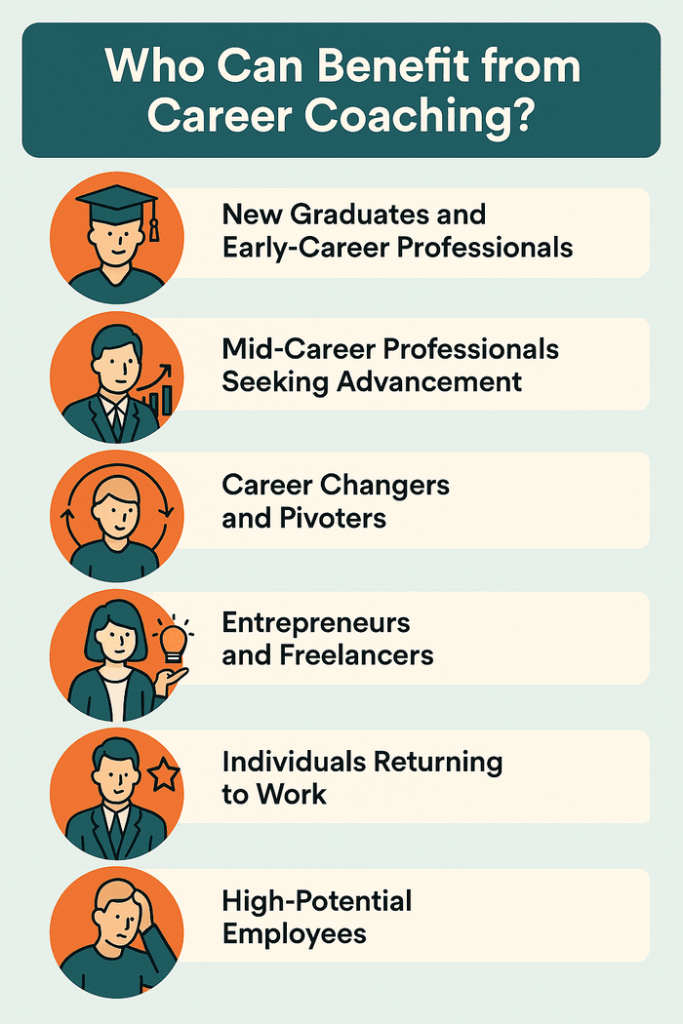
India’s economy has transformed dramatically over the last decade, and the demand for top business coach India services has grown...
In today’s dynamic and competitive job market, careers rarely follow a straight line. Many people feel stuck in roles that no longer fit their aspirations, struggle to identify their strengths, or simply don’t know where to begin when considering a change. Enter career coaching, a personalized, results‑oriented process designed to help you discover your purpose, plan your next steps, and unlock your potential. A career coach empowers you to set meaningful goals, develop new skills, and maintain the confidence needed to navigate an ever‑evolving professional landscape. Unlike advice from friends or family, career coaching provides objective guidance, ensuring your decisions are aligned with your personal values and long‑term goals.
This article dives deep into what career coaching is, how it works, and why it matters. We’ll explore the benefits for individuals and organizations, reveal the signs that indicate you might need a coach, and share actionable tips for finding the right professional to guide you. By the end, you’ll understand how career coaching can elevate your career and how to get started today.

Career coaching is a structured, goal‑oriented process in which a trained professional collaborates with you to identify your career aspirations and develop strategies to achieve them. According to career coaching experts, it involves engaging a dedicated external expert who offers guidance on career choices and helps you overcome challenges. A career coach provides fresh perspectives, asks powerful questions, and helps you clarify what you truly want from your professional life. Unlike personal advice from friends or family, career coaching delivers objective and neutral advice based on proven methods and experience.
Key characteristics of career coaching include:
In a world where careers evolve quickly, investing in your professional development through coaching can make the difference between stagnation and growth. Career coaching is particularly valuable when you’re navigating major transitions, looking to improve performance, or simply seeking clarity on your direction.
These principles make career coaching more than just professional advice—it’s a transformative journey that empowers you to take control of your career.
A typical career coaching engagement is a structured yet flexible process that adapts to your goals, timeline, and circumstances. While every coach has their own methodology, most coaching processes follow a similar sequence:
Throughout this process, career coaching combines practical guidance with deep personal reflection, enabling you to make informed decisions and progress confidently.
Career coaches offer a wide range of services tailored to their clients’ needs. According to career coaching guides, coaches perform tasks such as assessing your professional trajectory, identifying long‑term goals, and co‑creating action plans xMonks. Here are some key responsibilities:
A coach will ask questions about your job, responsibilities, challenges, and career history. They use this information to identify patterns, strengths, and areas for growth.
Coaches help clarify your short‑ and long‑term goals. This could include exploring new industries, seeking promotions, or balancing personal values with career ambitions. Clear goals allow you to focus your efforts and measure success.
Career coaches break down large goals into manageable tasks. They provide structure so you can prioritize tasks, set timelines, and track progress. Plans may include networking activities, skill acquisition, or targeted job applications.
Coaches guide you through the job search process by helping you craft compelling resumes and cover letters, practice interviews, and build your online presence. They may also help you leverage tools like LinkedIn to expand your network and connect with potential employers xMonks.
Unbiased feedback is a key component of coaching. Whether you’re considering a career change, negotiating an offer, or handling workplace conflict, a coach provides an impartial perspective to help you make informed decisions.
Many coaches focus on developing soft skills (communication, confidence, leadership) and technical skills relevant to your industry. They may recommend training, webinars, or books to enhance your capabilities and help you stand out.
Through regular sessions and check‑ins, your coach helps you stay on track. Knowing someone is invested in your progress fosters accountability and consistent action.
Whether you’re facing redundancy, returning to work after a break, or switching industries, career coaches provide guidance and emotional support during periods of transition.
By integrating these responsibilities, career coaches act as partners in your growth journey—providing clarity, structure, and motivation.

Career coaching is not just for people in crisis or those at a senior level—it can be valuable to anyone looking to improve or change their professional path. Everyone can benefit from career coaching at different stages of their career lifecycle. Here are groups that commonly seek career coaching:
Recent graduates and those early in their careers often need guidance on how to enter the workforce. A career coach helps them identify their strengths, set goals, and navigate applications, interviews, and networking events.
Professionals with several years of experience may feel stagnant or unfulfilled. Coaches help them position themselves for promotions, transition into leadership roles, or explore new industries.
Those looking to switch industries or roles benefit from the structured approach of a coach. They learn how to translate existing skills, navigate educational requirements, and build networks in new fields.
Coaches can help entrepreneurs clarify their business vision, manage time, and develop strategies to grow their enterprises. Freelancers may seek help with pricing strategies, client management, and self‑marketing.
People returning to work after a break—such as caregivers, parents, or those recovering from illness—may need help rebuilding confidence, updating skills, and navigating modern job search processes.
Organizations often invest in coaching for high‑potential employees to prepare them for leadership roles, improve engagement, and increase retention.
From interpersonal conflicts to performance issues, coaching helps individuals develop strategies for navigating difficult situations and improving workplace relationships.
Ultimately, anyone seeking clarity, direction, or growth in their career can benefit from coaching.
It’s not always obvious when you need a coach. Here are clear signs that career coaching could accelerate your progress:
If you feel lost, unsure of your next move, or unmotivated in your current role, a coach can help you identify what’s holding you back and create a plan to move forward.
Repeated unsuccessful job applications or stalled promotions could indicate a gap in your strategy. A coach can refine your resume, improve your interview skills, and help you network effectively.
Friends and family offer well‑meaning but sometimes biased advice. A career coach provides unbiased guidance and helps you make decisions based on facts, not emotions.
When your goals feel overwhelming, coaches break them into smaller tasks and help you maintain momentum. They provide accountability and celebrate small wins to keep you motivated.
If you’re constantly anxious about your future or feeling burned out, a coach can help you manage stress, develop coping strategies, and regain a sense of control.
Navigating layoffs, returning to work, or switching industries can be daunting. Coaches guide you through these transitions with confidence and clarity.
Recognizing these signs early allows you to proactively seek support and avoid prolonged stagnation.
Career coaching offers numerous advantages that extend beyond landing a job. Here’s how it benefits individuals and organizations:
Businesses that invest in career coaching for employees enjoy several benefits:
Both individuals and employers benefit immensely from career coaching—enhancing performance, satisfaction, and retention.
It’s easy to confuse career coaching with similar forms of support. While all three aim to help individuals succeed, they have distinct differences:
Summary: Coaching focuses on actionable strategies for future career growth, while counseling addresses past psychological factors. Mentorship offers industry experience and informal guidance. Choose the support based on your needs.
Career coaching comes in various forms, each designed for specific situations and goals:
One‑on‑one sessions tailored to your goals. Offers personalized support and privacy.
Sessions with multiple participants. Offers peer learning, networking, and shared experiences.
Focused on senior leaders or managers seeking promotions, leadership skills, and strategic vision. It often involves confidential guidance on high‑impact decisions.
Designed for professionals switching industries, returning to work, or pivoting to new roles. Coaches help you identify transferable skills and create plans for a smooth transition.
Ideal for job seekers who need help refining resumes, sharpening interview skills, and developing a targeted job search strategy.
Supports individuals preparing for leadership roles, focusing on communication, emotional intelligence, and strategic thinking.
For those launching or scaling businesses. Coaches guide business planning, marketing, time management, and mindset.
Blends personal growth with professional development, aiming for harmony between work and personal life.
Understanding these variations allows you to choose the type of coaching best suited to your needs.
Not all coaches are created equal. Selecting the right one is critical to achieving your goals. Here’s a step‑by‑step guide to finding the best fit:
Following these steps ensures you find a coach who aligns with your goals and values and who will challenge you to achieve the results you desire.
Knowing what happens during a coaching session helps manage expectations and ensure you’re prepared. While sessions differ based on the coach and goals, here’s a general outline:
Coaching sessions are confidential and focused on your needs. Some coaches may assign homework—journaling, networking tasks, or reading—to accelerate progress. Sessions often occur weekly or biweekly, giving you time to apply new insights while keeping momentum.
Coaching fees vary widely based on experience, location, specialization, and length of engagement. Here’s what you can expect:
Is it worth the investment? Research suggests that career coaching is often worth the cost. When you consider potential salary increases, improved performance, and greater career satisfaction, the returns can easily outweigh the expense.
Career coaching can be a transformative investment in your professional life. By partnering with a trained coach, you gain clarity on what you want, develop actionable strategies, and build the confidence needed to navigate an evolving job market. Whether you’re seeking a new job, aiming for a promotion, or simply looking to align your work with your values, coaching provides the structure and support to get you there.
To get started:
Remember, investing in yourself pays the best dividends. Career coaching empowers you to turn aspirations into achievements and create a career aligned with your values and passions. Take the first step today.
Most coaching engagements last between three and six months, depending on your goals, availability, and progress. Some people choose longer partnerships for ongoing support
No coach can guarantee a job, but they can significantly improve your chances by refining your job search strategies, enhancing your interview performance, and helping you network effectivelyuk.indeed.com.
No. Coaching helps you advance in your current field, develop leadership skills, navigate workplace issues, and improve work‑life balance.
Yes. Coaches can provide strategies and role‑play scenarios to help you negotiate better compensation packages.
Absolutely. Many coaches offer virtual sessions via video conferencing, which allows you to work with top coaches regardless of location.
Yes. Resume services focus primarily on documents. Coaching goes beyond that—helping you clarify goals, develop skills, and navigate the entire job search and career progression process.
Ask for certifications (e.g., ICF), professional experience, client testimonials, and references. Many coaches provide trial sessions so you can evaluate their fit.
Yes. Professional coaches adhere to ethical guidelines that ensure confidentiality, creating a safe space for open dialogue.
Coaches can help you discover your goals through reflective exercises. You don’t need a fully formed goal to start coaching; sometimes the goal is to identify your goal.
Yes. Coaches encourage networking and may help you identify networking opportunities, craft professional introductions, and develop strategies for building relationships

India’s economy has transformed dramatically over the last decade, and the demand for top business coach India services has grown...

When searching for a certified life coach program price, it’s natural to start by comparing tuition fees. Aspiring coaches want...

Neuro-Linguistic Programming (NLP) is experiencing a resurgence in India. Social media, workshops and high-energy seminars promise instant breakthroughs by rewiring...

Many professionals pursue the title of Certified Organizational Development Coach with the expectation that a credential alone will open corporate...

Some providers offer to fast-track you to PCC status through purely online modules for a fraction of the cost of...

Executive coaching has evolved from a niche service for struggling leaders into a strategic investment for organisations aiming to build...

When prospective coaches research training options, cost is often the first number they look for. A quick internet search produces...

Deciding to invest in life coach training programmes can be a transformative milestone in your personal and professional journey. In...

Choosing the right online life coaching courses can be one of the most transformative decisions you ever make.